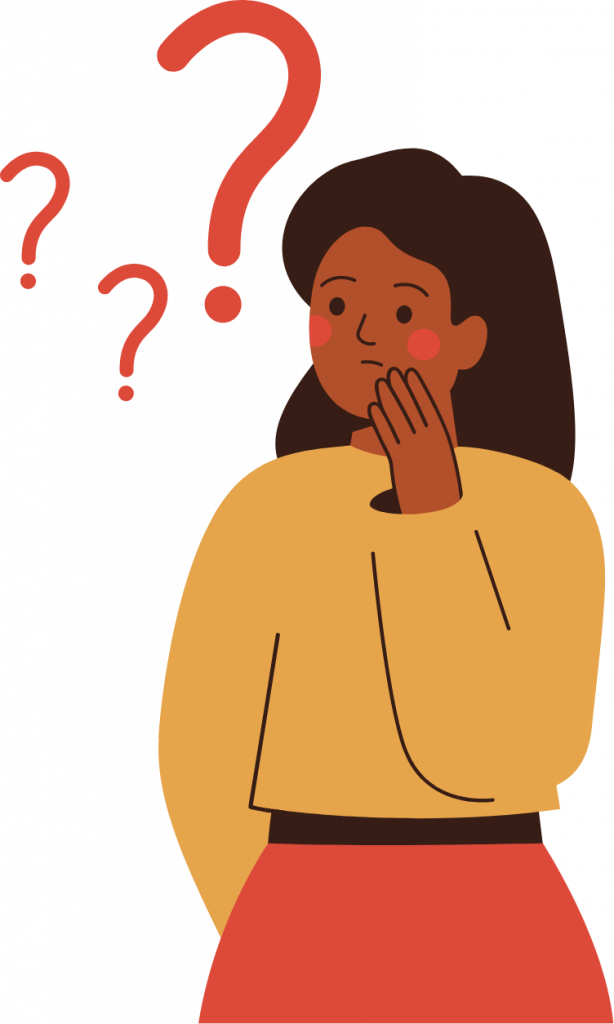

Depression
What Is it?
Depression is a mood disorder which means it affects how a person is feeling. It can cause a person to feel sad much of the time or they might lose interest in the things they used to enjoy. Depression impacts how a person thinks, acts, and feels. A person with depression is affected physically and emotionally. Depression can make it difficult to do normal daily activities.
Myths About Depression
FACT – Depression looks different for everyone and not everyone feels sad all the time with depression.
People often think depression and sadness are the same thing, but they are not. Sadness is an emotion people feel, just like being happy or mad. Everyone feels sad from time to time as a reaction to life. If someone’s sadness goes away and do not impact their life, it is likely not depression. Depression is more than feeling sad. There are some people with depression who do not feel sad. They feel nothing. Depression is different for everyone who has it.
FACT – There is not just one cause of depression.
Mental health is influenced by many different things. The causes of depression are complex. It could be many different factors, such as life events/circumstances, genetics, and medication side effects. This is why successful treatment can look so different for everyone. Depression is wide-ranging in experiences, causes, and treatments.
FACT – Depression can impact anyone.
Depression does not impact just one group of people. More than 264 million people are affected worldwide by depression. Depression impacts people from all backgrounds, ethnicities, age groups, occupations, etc. People of all walks of life can be impacted.
FACT – Depression can impact anyone of any age.
Have you ever been told you cannot have stress because you are just a kid and heard, “Just wait until you are an adult and then you will see what stress is”? Well, that is not true, is it? Just because you do not have the same stressors as an adult. It does not mean you cannot have stress. It is the same with depression. First, depression does not have to be caused by life events. It can be caused by things like chemical imbalances and genetics. A person can have a seemingly wonderful life and have depression. Second, younger people can face many challenges in their lives. Just because someone is young, it does not mean their life has been without challenges. Third, there are many challenges in the world today which you face which other generations have not faced before. Technology and social media have created a whole new set of problems, expectations, and stress.
FACT – Depression is an illness.
PET scan of the brain for depression – Mayo Clinic
There is a very real biological side to depression. If someone has depression, they are not “making it up,” “looking for attention,” nor are they “choosing to be depressed.” If you were to look up brain scans, there is a visible difference between someone with depression and someone without depression. If a person has depression, their brain has less activity which can make it harder to think clearly and do the things which need to be done in a day.
FACT – A person who is struggling with depression needs professional help.
If depression is left untreated, there is a chance it will become more severe or last longer. It is not just a phase a person will grow out of and become better. It is not someone being a moody youth/teenager. The person needs proper help to help cope with their depression. Depression comes with a high risk of suicide. Therefore, it is important to get professional help.
FACT – Everyone experiences depression differently.
You might have heard some version of the phrase “When I had depression, I could…They should be able to, too.” There is no one size fits all experience for depression. There is a wide range of symptoms, and everyone experiences it differently. Even if there are two people who have the same symptom, like exhaustion, it will be different for both. One may not be able to get out of bed. The other could be able to do all the tasks the day requires with tiredness nagging them. Everyone’s experience is different, and everyone’s experience is valid.
FACT – Mental health concerns are not gendered.
Depression impacts people of all genders. People of the 2SLGBTQ+ community are at a higher risk for mood disorders. Women are more likely to develop depression, but that does not undermine the fact men have depression as well. The gap between men and women could also be influenced by men not reaching out for help, so their cases could be underreported.
FACT – There are many different types of treatments for depression
There are many successful treatments for depression. Treatments could include medication, therapy, and alternative therapies, like music and art therapy. In addition to medication and therapies, encouraging a mind-body connection can also help support wellness. This could include relaxation techniques, music/art/drama therapy, exercise, or meditation.
If a person is taking antidepressants (medication) and feels numb, this is an indication the person needs to visit their doctor. Antidepressants should not make a person feel numb. Numbness can be a symptom of depression and the goal of antidepressants is to help relieve the symptoms.
FACT – It is possible to be okay.
With help and healthy habits, it is possible to manage the symptoms of depression. Treatment has proven to be successful. Since there are many causes of depression, it is about finding the appropriate types of therapy which work for the individual.


Causes of Depression
This is a complex subject. There are some people who feel that depression is because of a personal flaw. This is incorrect. Personal flaws are not the cause of depression or any other mental illness. This ideal is based on the stigma and misinformation surrounding mental health. It illustrates the prejudice people face with depression and other mental health concerns.
The cause of depression is different for everyone. For many people, there is not just one cause. The causes can range from genetics, chemical imbalance in the brain, stressful life events, trauma, losses, or medical problems.
What Does It Look Like?
NOTE – This is not for self-diagnosis. If you feel like you or someone you love is struggling, please seek help from a health care professional.
Depression can look like many things and everyone with depression has a different experience. To be classified as depression, the symptoms need to be present for at least 2 weeks. These symptoms occur a lot of the time.
Symptoms could include:
- Sadness
- Irritability
- Loss of pleasure or interest
- Significant weight fluctuations/eating more or less
- Sleeping more or less
- Restlessness or slowness in movement
- Tiredness or fatigue
- Lack of concentration
- Thoughts of suicide
- Sleeping all the time or not at all
- Not changing their clothes, showering, or taking care of themselves
- Eating more or less
- Poor concentration
- Withdrawing or not wanting to do anything
- Daydreaming or seemingly off in their own world
- Missing assignments, work, school, or other commitments (outside of unexpected life events or occasional incidences)
- Fluctuating emotions
- Recklessness
- Increase in the phone, video game, substances use, or other forms of escapism
- Negative self-talk
- Poor attendance at school/activities
- Apathetic or emotionless
- Unexplained body pain or physical problems, like stomachache
- Acting like nothing’s wrong or no noticeable changes (the person might be hiding what they are going through for a variety of reasons)
It is important to remember that, while some people may display some of these signs, it does not necessarily mean they have depression. They could be coping with a difficult time in their life. Therefore, it is important to start a conversation with the person. If you do not feel comfortable talking to the person, you must tell someone who will have the conversation.


What To Do If You Think You Have Depression?
If you feel like you are struggling or any of the signs sound like what you are going through, please seek help. Seeking help can sound like a daunting task and it can seem overwhelming, but it is so important. You deserve to feel better and be happy. What can you do if you are struggling with depression?
- Identify that you are not doing well. It is not an easy thing to admit. Just remember, we cannot be tiptop all the time. It is okay not to be okay. It is about seeking help.
- Talk to someone. Seek help with someone you trust whether a loved one, doctor, elder, spiritual leader, or a mental health professional. You deserve to feel better. It is important to take care of yourself and feel better. Seeking mental health help is very important.
For example, a doctor will be able to diagnose you if you have depression. When you go to the doctor, they will ask a series of questions. These questions relate to your last few weeks. Part of depression can make it difficult to concentrate which can make these questions tricky. To combat this, you can take notes of your experiences. In addition to a doctor, counselors can help you to work through the emotions and difficult experiences. Developing a support system of loved ones (including pets!) and professional help (including helplines) can help you with your depression.
- Practice self-care. Self-care is taking time to take care of your health and wellness. Make healthy choices to support your mental health. Take some time for you to feel better, to unwind, and to take care of yourself.
In addition to seeking professional support, there are many things you can do to support your wellness. Check out the Tips for Wellness below or the Wellness Sessions.
How to Help a Person Who Tells You They are Struggling?
When a loved one tells you they are struggling, it can be terrifying, and it can be hard to know what to do/say. It is easy to become caught up in emotions. Many people fear saying the wrong thing. We often want to try to fix our loved one’s problems or counsel them, but that is not your job. Your main job is to connect your loved one to help.
The following are some guidelines of what to do when your loved one tells you they are struggling and how to handle those difficult conversations. This is not to counsel the person. This is to get the person connected with a helping professional. Please remember the conversation will not be linear like on the page. These are guidelines of some things to consider.
- Take a deep breath and stay calm. The person is telling you something scary and personal to them. This is terrifying for both of you. Take a moment to gather yourself and take a deep breath. Remember this is about them and their experience. When we care about someone and they tell us about their struggles, we sometimes react with what seems like anger. This is often an outward display of fear which comes across as anger. This can make it difficult for the person to open up to you.
- Practice self-awareness. Take a moment to recognize your own biases or judgements about mental health issues. You are entitled to your opinion, but remember this conversation is about your loved one. It is about their emotions, experiences, and perception. It is all valid and real for them. If you are going to have the conversation, place your judgements or preconceived notions aside to allow for understanding and compassion.
- Remember VEER Validate, Encourage, Empower, Refer. (This is not counselling the person. It is connecting them with help.)
Validate – Validating is so important. It is letting the person know what they are feeling is okay. It is acknowledging their emotions as understandable.
For example:
- Yeah, that would be frustrating.
- I am sorry that happened to you.
- It is understandable you feel that way. I would feel that way, too.
- I believe you.
- From what you are saying, I am hearing you are…because of… Is that correct?
Encourage – This is letting the person know they did a good thing by telling you. Talking about mental health struggles can be very challenging. Let them know they are doing the right thing by telling you.
For example:
- Thank you for telling me. That must have been challenging.
- You did the right thing by telling me.
- I am here for you.
Empower – Struggling with mental health issues can be overwhelming, so it is important to let the person know there is help and they can feel better.
For example:
- I know things seem really overwhelming, but there are resources and people to help.
- Let’s find some things which can help you feel better.
- You deserve to feel happy! We will find a way to get there.
Refer – Connect the person with help. They deserve to feel happy and healthy again. There are resources to help them. The youth needs to get help. You are obligated to connect the youth with professional help. Refer the youth to professional help like a school counsellor, family liaison worker, or an elder. You can also offer them some helplines they can call when they are struggling, too.
For example:
- Here are some phone numbers you can call when you feel like you need someone to talk to.
- Let’s look up some resources and see what you like best.
- There are many options of people you can talk to. We could talk to the doctor, find a counsellor, or elder. What are you most comfortable with?
Sometimes, people are not ready to talk to you. That is okay. It is their choice. Simply let them know you are there to talk if they need someone and give them resources.

How to Start the Conversation?
If you have a feeling something is going on, have a conversation with the person if you feel comfortable talking to them. (If you do not feel comfortable, that is okay. You just need to tell someone who will have the conversation with them and connect them with help.)
The following are some guidelines of what to do if you suspect someone is suicidal or not doing well. This is not to counsel the person. This is to get the person connected with a counsellor, doctor, or another professional. Please remember the conversation will not be linear like on the page. These are guidelines of some things to consider.
Before You Have the Conversation
- Make sure you have time for it
- You are in a place the person will feel comfortable talking to you
- Approach the situation with compassion
- Make sure you are willing to listen
- Remember you can initiate the conversation and let them know you are there, but it may take some time before they talk to you.
- Take notice. If you feel like something is going on with someone, there likely is something. Trust that gut instinct.
- Talk to them. Open the conversation in a nonjudgemental and compassionate way. Begin the conversation by stating a change you have noticed. Use “I” statements so it does not feel like you are accusing them.
- Example: “Hey, I have noticed you have been cancelling plans lately. How are you doing?” or “I heard you putting yourself down in class. What’s been going on?”
- Remember VEER Validate, Encourage, Empower, Refer. (This is not counselling the person. It is connecting them with help).
Your loved one may not be ready to talk, and that is okay. Let them know you are there to talk whenever they are ready. You can give them numbers to helplines for support.

Follow-Up Support
- Educate yourself about depression
- Remember everyone’s experience with depression is different
- Try not to take your child’s symptoms personally
- Encourage and support your child’s wellness journey
- Support your child going to professional help by taking them to the doctor/counselor or help book appointments if needed
- Model healthy coping skills
- Listen to your child and be a safe place for them if they need to talk
- Seek help for your own mental health and the stress of supporting someone with depression
- Take care of yourself
Things to Avoid
- Comparing mental health journeys
- Everyone’s mental health journey is different. For example, two people with depression could experience different symptoms. Their experiences can be very different.
- Blaming the person for their illness
- Depression and other mental illnesses are not a personal flaw. There are times when the person may not have the capacity to do certain things.
- Downplaying the person’s experience
- “At least…” This is a common statement. While it is well-meaning, it downplays the person’s experience. It implies the person should be grateful or happy it is not worse. The person has a right to be upset. They have a right to feel their emotions.
- Toxic positivity
- Practicing gratitude is a wonderfully beneficial thing to do and can help improve mood and mental health, but the sunshine outlook can sometimes take a dark turn. Toxic positivity is reframing the situation (even tragic ones) in a positive light. This is the “At least…” or “It could be worse…” It is not letting ourselves (or others) feel the uncomfortable emotions. It is okay to feel upset about something. It is okay not to be okay, but toxic positivity suppresses any of those emotions. Positive outlooks can be a wonderful thing, but not when it comes at the expense of coping with emotions and difficult situations.
- Pushing your values and beliefs on the person
- They are their own person with a right to make their own choices, and what might work for you might not work for someone else.
- Ignoring the situation
- When a situation is challenging, avoidance might seem like the answer. Depression is not something to ignore. It will not just fade away with no intervention. Depression also comes with a high risk of suicide, so ignoring depression increases this risk.
- Making it about you
- This is about the person. When we get scared, we sometimes internalize the problem or make it about us.
Tips for Wellness
In addition to professional help, there are many things which can help support wellness, such as:

- Prioritize and organize your time
- Journal or talk about your emotions
- Connect with others
- Find support groups
- Find healthy ways to relax
- Declutter your life
- Reach out for help
- Practice gratitude (think of things to be grateful for. It could be as simple as clean air to breathe).
- Exercise
- Learn a new hobby
- Go outside
**Please note: These are healthy coping skills which support mental health. It does not mean depression will disappear after practicing one of these things. These suggestions support wellness.
Further Resources
Depression (major depressive disorder) – Diagnosis and treatment – Mayo Clinic
Depression in women: Understanding the gender gap – Mayo Clinic
Impacts on Mental Health (statcan.gc.ca)
Social media use and depression in adolescents: a scoping review (nih.gov)
Toxic positivity: Definition, risks, how to avoid, and more (medicalnewstoday.com)
What causes depression? – Harvard Health
What’s the difference between sadness and depression? | Here to Help
If you would like to speak to someone about mental health issues, the Alberta Health Services Mental Health Help Line is available 24/7, offering information and referrals on any aspect of mental health.
Call toll-free: 1-877-303-2642
Trending Topics
Depression
Depression What Is it? Depression is a mood disorder which means it affects how a person is feeling. It can cause a person to feel
Schizophrenia
Schizophrenia What Is it? Schizophrenia is a mental disorder that impacts how a person views reality. A person with schizophrenia might have hallucinations, delusions, and
Star Breathing
Star Breathing Star Breathing is a wonderful way to calm your mind and body. It helps you to be present in the moment. As you
Parenting Tips
Parenting Tips Parenting/caregiving does not come with a handbook. It can be an exceptionally challenging job. There are organizations, courses, and agencies which can help
Dimensions of Health
Dimensions of Health How do you feel when you wake up on your best day? You probably feel well-rested. You probably wake up to a

